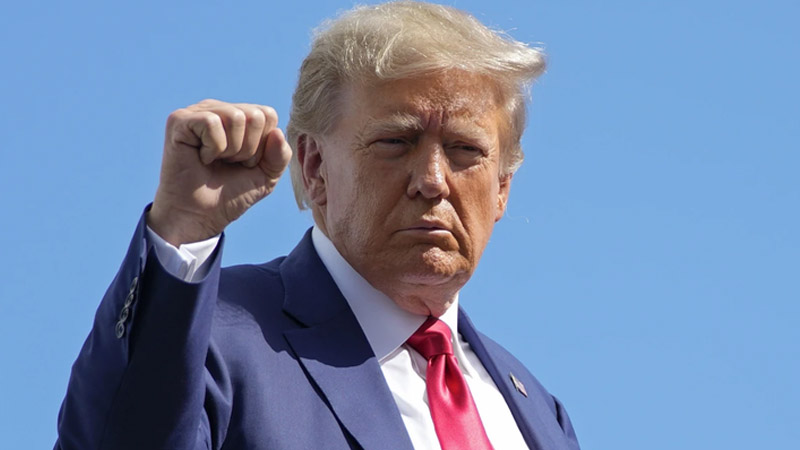Trump Questions Necessity of Election Despite Leading in Polls

Photo: AP/Alex Brandon
In a surprising and controversial statement, former President Donald Trump has questioned the necessity of holding an election in 2024, citing his strong standing in opinion polls. According to a report by The Mirror on Saturday, August 17, 2024. During a private meeting with his campaign team on August 16, 2024, Trump reportedly asked, “If I’m leading in the polls, why do we need an election?” This remark has ignited a firestorm of criticism and raised serious concerns about the integrity of the democratic process.
The comments were made at Trump’s Mar-a-Lago estate during a strategy session where his campaign team was discussing their upcoming plans and tactics. According to sources who were present, Trump’s question seemed to reflect his frustration with the electoral process and his continued focus on polling numbers as a barometer of his political strength. The former president’s comment highlights his longstanding skepticism about the fairness of the political system and his dissatisfaction with how he is treated by the media and political opponents.
The context of Trump’s statement appears to be rooted in his belief that he is in a strong position to win the 2024 presidential election, given his leading status in various polls. However, his questioning of the electoral process has been widely condemned by political analysts and commentators, who argue that such remarks undermine the democratic foundations of the United States.
Critics have been quick to voice their concerns over Trump’s comment. Senator Lisa Greene, a prominent critic of the former president, described the statement as “alarming and deeply troubling.” She emphasized the importance of maintaining trust in the electoral system, saying, “Our democracy depends on free and fair elections. Suggesting that an election might not be necessary if someone is leading in the polls undermines the very essence of our democratic principles.”
Trump’s campaign spokesperson, Jenna Roberts, defended the former president’s comments, framing them as a reflection of his confidence and frustration with the political establishment. “President Trump is expressing his belief that he is being treated unfairly by the media and the political system,” Roberts said. “He’s been a strong leader and has significant support, which is why he feels so strongly about his position. His comments should be understood in the context of his longstanding battle against what he perceives as bias and unfairness.”
The former president’s remarks come at a time when his campaign is facing multiple challenges. Despite his high polling numbers, Trump is dealing with a competitive primary race and ongoing investigations into various legal issues. His questioning of the electoral process could be seen as a reflection of his broader frustrations with the political landscape and his contentious relationship with the media.
The incident has sparked a debate about the role of polling in shaping perceptions of electoral legitimacy. Some argue that polls are not a definitive measure of electoral success and that the democratic process requires an actual vote to determine the outcome. “Polling numbers are just a snapshot of current public opinion,” said political analyst Maria Lopez. “They do not replace the need for an actual election. The integrity of our electoral system depends on the principle that all candidates have the opportunity to compete and that voters make the final decision.”
Trump’s statement has also led to calls for increased transparency and accountability in the political process. Critics are urging both political leaders and the public to reaffirm their commitment to democratic norms and to resist any attempts to undermine the electoral system. “It is crucial that we remain vigilant and ensure that our elections are conducted fairly and transparently,” said Democratic strategist David Klein. “Comments like those made by Trump highlight the need for continued vigilance and a strong commitment to democratic principles.”
As the 2024 election cycle progresses, Trump’s questioning of the electoral process is likely to remain a point of contention and debate. The former president’s remarks underscore the deep divisions and controversies that characterize the current political climate. The focus now shifts to how Trump’s comments will impact his campaign and whether they will influence the broader discourse on electoral integrity and democratic norms.
For now, the political world is grappling with the implications of Trump’s statement and its potential effects on the upcoming election. As the investigation into his comments continues, both supporters and critics are watching closely to see how this latest controversy will unfold and what it means for the future of American democracy.





